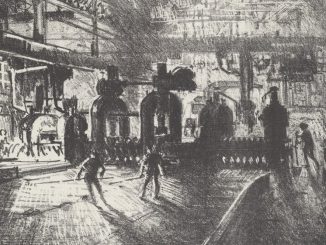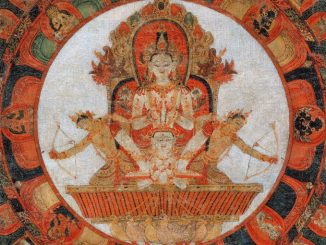
Tyehimba Jess is the 2017 Pulitzer Prize winner for poetry. His book, Olio, is a magnificently engineered collection of poems that explore black voices in the decades from Civil War times to the start of World War I.
Juju or juju (French: joujou, lit. ‘plaything’) is a spiritual belief system incorporating objects, such as amulets and spells used in religious practice in West Africa. The term has been applied to traditional West African religions.
There are black men and women of the old West African tribes, the ancient empires, still performing this ancient artform at its highest levels. However, they are now called Pulitzer Prize winners. Their originality is unquestionable. They are connected to the source—their mastery of their high art is celebrated and lauded. They don’t use objects in the ultimate manifestation of their craft. Gone are the amulets, bones, stones, and rooster blood. Maybe they use pens, 8×11 yellow ruler bound paper, a laptop or a notes app on their smartphone. Mostly, however, they now confer their work on skulls and within souls. They still use the drums—djembe. They will invade your dreams. They will craft realities hereto impossible. They put it on American Democracy, within Capitalism and sew it into Christian traditions. It has taken centuries to perfect their craft but the spells which they weave in rhythm, rhyme, and meter and, sometimes, melody. Sometimes they just put it in a word—these so-called poets, novelists, or essayists. They place that word on a page in such a way that it disrupts your thoughts or stops your heart. Maybe it makes you feel like you can fly to the heavens. Or, just lay down and die. Or, just want to cry, wallow in misery. That’s juju, when the world is in a word and that word carries the power of spirit.
The term “juju” is commonly used to refer to the feeling of something. For example, if a person feels offset by an object or place, they would say that the object or place has “bad juju.” In the modern age, we take some creative genius to splash some cool, take some marketing and branding savvy, dress it up real contemporary, and call it, say, a Pulitzer Prize. It’s how we do what we do.
George Walker became the first African American to receive a coveted Pulitzer Prize in Music in 1996 for his work Lilacs. Walker, who is noted as one of the greatest composers of his time, was also the first African American to graduate from the Curtis Institute in 1954, receive a doctorate degree from Eastman School in 1956, and become a tenured faculty member at Smith College.
Gwendolyn Brooks became the first African to win a Pulitzer Prize for poetry in 1950 for her book Annie Allen, which chronicles the evolution of a young black girl into womanhood through poetry. Brooks, a literary giant who focused much of her work on documenting the lives and struggle of African Americans and migrants, was also the first black woman to serve as the poetry consultant to the Library of Congress.
Then there is the immortal playwright August Wilson. Also, there was recently Kendrick Lamar of Compton (or Bompton). There was also Colson Whitehead and his Underground Railroad, of which Oprah Winfrey said, “Every now and then a book comes along that reaches the marrow of your bones, settles in, and stays forever. This is one. It’s a tour de force, and I don’t say that lightly.”
And so there is Tyehimba Jess. Does that name mean anything to you? It ought to. Gwendolyn Brooks, Colson Whitehead, Suzan-Lori Parks, Kendrick Lamar all share space in rhythm, rhyme, melody, harmony of this juju spirit. Olio is Tyehimba juju. Much as Damn is Kendrick Lamar’s. Much as Annie Allen was Gwendolyn Brooks’s. He is also the recipient of the National Book Critics Circle Award for Poetry and PEN/Jean Stein Book Award for his magical work. When we spoke, he was in the midst of his national tour with stops in Exedor, South Carolina, D.C., and San Francisco. He thoroughly enjoys doing these readings—he loves putting poetry into the world.
This juju man is a juju lightworker at the highest possible frequency. Part fact, part fiction, part meditation, part dream (at times, American nightmare)—Tyehimba Jess’s much heralded and celebrated second book of poetry blends sonnets, story, and narration to look at the uncelebrated lives of African American performers from 1861 to 1918, before and after the Civil War up to World War I, as an American Empire was coming into its own. Olio is an effort to understand how they came together, formed their own resistance, survived, thrived, co-opted, and sometimes defeated attempts to minstrelize them:
So, while I lead this choir, I still find that
I’m being led…I’m a missionary
mending my faith in the midst of this flock…
I toil in their fields of praise. When folks see
these freedmen stand and sing, they hear their God
speak in tongues. These nine dark mouths sing shelter
they echo a hymn’s haven from slavery’s weather.

Pulitzer Prize Winner
Patrick A. Howell: First off, congratulations, Tyehimba, on your 2017 Pulitzer Prize for poetry. You are sharing some rarified company with the likes of Gwendolyn Brooks and her 1950 Annie. Rita Dove and her 1987 Thomas and Beulah. Toni Morrison and Beloved. Duke Ellington, Thelonious Monk, and August Wilson were all awarded the Pulitzer posthumously, a virtual who’s who of American culture. What, if any, has been the change in reception to you and your work since being awarded?
Tyehimba Jess: No real significant changes other than feeling honored to have the prize, feeling surreal about it. The best thing about it was living in Chicago (for the first time) since I did since 2002. I spent a year in Chicago on sabbatical and [I was] there on the 100th anniversary of Gwendolyn Brooks’s birthday. That was great and pretty cool. I remember going to her funeral and I also remember seeing her in real life and being in awe of her mastery of the language. I think it was kind of karmic to be back in Chicago when they announced that award. It was her hundredth birthday this year (2017). She is out of Chicago and she writes a lot about Chicago. To win on the 100th anniversary of her birth was special for me.
PAH: Also, do you have a particular relationship with previous Pulitzer Prize winner Yusef Komunyakaa?
TJ: I would say primarily my relationship with him is I saw him read a couple years after he won the Pulitzer and seeing him read was a revelation to me. I used to run around with Neon Vernacular kind of grooved to my side. [Laughing.] I have always been in awe of his work, and then I finally got to meet him when I was in graduate school and I would see how he rolled and see how he handled himself. He has always been a model of class. But also, one thing Yusef is about is the image, and reading his work has really pounded the importance of imagery through to me. His work is so vivid and so electrified. He’s been an inspiration for years.
Chicago to Brooklyn and the Black Ethos
PAH: You relocated from Chicago to Brooklyn earlier last year. Currently, you are teaching at Staten Island College. Detroit, where you were born, is also another city with a strong black culture. All cities are epicenters of Black American Culture, a.k.a. American Culture. I note your work with Sterling Plump whose teaching focused on the era of the Harlem Renaissance and Black Arts Movement. How does the black culture, ethos, spirit inform your work? Specifically, I recall a quote by Toni Morrison in which she said, “I’m writing for black people…I don’t have to apologize.” Further, she has noted in Playing in the Dark, her 1990s literary treatise:
The habit of ignoring race is understood to be a graceful, even generous, liberal gesture. To notice is to recognize an already discredited difference. To enforce its invisibility through silence is to allow the black body a shadowless participation in the dominant cultural body. According to this logic, every well-bred instinct argues against noticing and forecloses adult discourse. It is just this concept of literary and scholarly moeurs (which functions smoothly in literary criticism, but neither makes nor receives credible claims in other disciplines) that has terminated the shelf life of some once extremely well-regarded American authors and blocked access to remarkable insights in their works.
Is there a social agenda, spiritual work, a hope, a mindset that informs your work? Are you just reflecting voices that came before you?
TJ: I think there is definitely the idea of reclaiming, as Maxine Waters would say, reclaiming our time; reclaiming our history, reclaiming voices from the past, reclaiming narratives of the past still inform the way we encounter race today.
I am interested in exploring the spirit of these many folks in Olio who were dedicated to the idea of bringing their art to a larger population. I want to explore the many types of conflicts they had to work with regarding race and they were only able to come through sheer grit and talent. I am dedicated to the idea of telling their stories in unique and layered ways.
Giving Respect to Those Who Came Before
PAH: In Olio, your Pulitzer Prize-winning effort (and only 2nd outing as a poet), you reference the work of Edmonia Lewis, Henry Box Brown, John William Boone, Fisk Jubilee Singers, Ernest Hogan, Blind Tom Wiggins, George Walker, Bert Williams…and one of my all-time favorites Paul Laurence Dunbar. How do you approach your work? What is your process? How do you create such intimate portraits and caricatures of those in the times before our times? Why focus on the ancestors and their lives—what about those who are in the future and the genius of our current poets? What do you know about the world of our ancestors because of your work with Olio that most do not consider?
TJ: Writing the book was a discovery for me because I didn’t know about many of these people. I didn’t know about many of their histories. It was for my edification. I was able to explore the histories of people that I’d only understood in a rudimentary fashion. It was gratifying to be able to explore their lives and to find new ways to bring them onto the page. Insofar as how my research and my writing process goes, it is heavily informed by a lot of research. That means seeking out as much information as I can, as many archives as I can, about the folks that I am interested in. Then I build a structure of poems that explore, in a meaningful way, the core issues of their lives.

“Any Human to Another”
PAH: Countee Cullen’s poem “Any Human to Another” is one of my all-time favorites, specifically that passage:
The ills I sorrow at
Not me alone
Like an arrow,
Pierce to the marrow,
Through the fat
And past the bone.
Your grief and mine
Must intertwine
Like sea and river,
Be fused and mingle,
Diverse yet single,
Forever and forever.
Of the artists, you honored in Olio, is there a particular figure or work of a figure that is your own personal Kanye West, Michael Jackson or Beyonce…someone whose work speaks to you and your work consistently, decade after decade? Is there somebody who constantly inspires you to take it to the next level, go places you have not gone previously?
TJ: All of them do. All of them were fascinating because they had to work in what was called the nadir of American race relations, at the height of public lynchings in the United States. (Although we still have lynchings today that are executed in a different kind of form.)
They were all superstars in one way or another. Scott Joplin, creator of Ragtime. Edmonia Lewis, the most successful African American artist of the 19th century even though she had to leave the country. The McCoy twins (Millie and Christian), who were able to persevere through slavery and the very violations of their bodies countless times but were still able to maintain their integrity, buying plantations for their entire families. John Williams Boone, who could play any song that you wanted back to you at the drop of a hat. He built his career around another fascinating individual who was autistic and blind and was able to find a way to express himself past those obstacles, Blind Tom Wiggins. Wiggins was forced to endure the ownership of the same white family for his entire life while they exploited his piano playing for a million dollars in profit. Sissieretta Jones was a badass opera singer who was at the top of her field and really, really cared about people around her. She died in relative obscurity but sought to maintain her integrity. The Fisk Jubilee singers were nine youngsters, late teen and early twenty-year-olds who spread the spiritual and gospel of black voice across the globe for the first time. They were messengers, they were evangelists of the free black voice in the early 1870s. Every spiritual singer today owes them a debt.
They are all fascinating individuals. Bert Williams and George Walker—they were working through a conundrum. They were trying to work out of black caricatures of the comedy industry and minstrel show in order to create three-dimensional characters. They used their resources and their name to make the first independent black theater productions in the country. They were not just clowns. They were trying to make more honest portrayals of their people. Henry Box Brown, who put himself in a box and escaped from slavery. He literally came out of the box—a two-and-a-half by three-foot box—singing. And when white folks came from the South and tried to drag him back into slavery, he said, “Nope, I’m going to England. Peace y’all!” He went to England and started a whole other career as an entertainer and abolitionist in England. He spoke out for black slaves in the United States. Fascinating!
All these folks! Paul Laurence Dunbar and Booker T. Washington. Paul Laurence Dunbar was the first black poet to make a living off of his poetry. He had elegance and grace and power and a seething ministerial awe in all of his work. He had control and mastery of form. And then Booker T. Washington was a conflicted figure but a human dynamo who was also kind of operating with a mask on. One mask he would show to the white establishment. Another mask he would show to his people. And a few other masks in between. [Laughing.]
PAH: Is it our people’s creativity? Is it overcoming the struggle? Is it a little bit of both? What is the commonality in all of it?
TJ: I think that the folk in Olio clearly had more to struggle against in their careers and in their lives. But I think that one crucial way they did it was through their creativity. One of the missions of the book is to look at black creativity at a particular time when we really don’t think about our capacity to be creative. This is the first generation that tasted freedom. The question is, how were they interested in exploring their creativity through their freedom? Creating for their own edification and not for that of a master for the first time in their lives? What is that like? What forms does that take?
There was this explosion of black creativity—and the folks in Olio are just a small chunk of the huge population of black musicians, actors, artists. And we are still wrestling with many of the same questions they were dealing with—how do I comport myself? How do I wrestle with these difficult decisions about the maintenance of my craft and my life? How do I navigate the shallow, rocky shoals of prejudice and racial hatred through the 19th, 20th, and 21st centuries? How do I maintain a vision for my art that I can be proud of, that I sincerely love? How do I protect that and work that in this inferno of America’s racial animus?
Alt-right, Alt-left—2 Americas
PAH: Jess, you are growing in your influence as both a professor/teacher and poet. You have the ability to not only reflect American culture through your own unique prism, but set the tone. In politics, they say the pendulum swings from left (Obama and the Democrats) to right (Trump and the Republicans)…I see a slight overcorrection from left to Alt-right… also, there are clearly two Americas dealing with the legacy of slavery. I believe there will be an overcorrection to Alt-left in the near term. In the vision of Tyehimba Jess, what does the future of America portend for her citizens? What do you think your children or those in the world to come will say of our times? In the year 2117?
TJ: When we are talking about 1917 we are talking about a black population in the rise of an empire. World War I was the cataclysm that made the United States a true world power. Right now, 100 years later, we are looking at the decline of that world power. The current administration and the preceding overextension of American empire, the corruption of every branch of government, etc. How we will be seen 100 years from now will depend on how we hold steady to the principles we proclaim in the best of our art, in the best of our political, social, and artistic action. Hopefully, we will make choices that will inspire future generations to look within themselves and search out the most honest and original expressions of themselves that look along the long arc toward justice.

TYEHIMBA JESS is the author of two books of poetry, Leadbelly and Olio. Olio won the 2017 Pulitzer Prize, the Anisfield-Wolf Book Award, The Midland Society Author’s Award in Poetry, and received an Outstanding Contribution to Publishing Citation from the Black Caucus of the American Library Association. It was also nominated for the National Book Critics Circle Award, the PEN Jean Stein Book Award, and the Kingsley Tufts Poetry Award. Leadbelly was a winner of the 2004 National Poetry Series. The Library Journal and Black Issues Book Review both named it one of the “Best Poetry Books of 2005.”
To learn more about Tyehimba Jess, his book, and upcoming events, visit his website: tyehimbajess.net

PATRICK A. HOWELL is an award-winning banker, business leader, entrepreneur, and writer. Howell is a frequent contributing writer to the Huffington Post, Tishman Review‘s Craft Talk series, Into the Void, and is a Good Men Project Blue Box Columnist. His first work was published with the UC Berkeley African American Literary Review and Quarterly Black Book Review. At Cal Berkeley, he co-founded Diatribe—a People of Color News Collective. Howell’s integrated book of poetry-design, Yes, We Be, was published by Jacar Press in February of 2018. He graduated from the Leopardi Writer’s Conference in Recanati Italy to complete work on Quarter ’til Judgement Day, a coming of age experimental fiction work.
Twitter: @patrickanthony
Featured image: Joanna Staniszewski, “Jasper Reverie,” mixed media, 2018.


